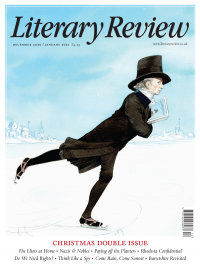David Pryce-Jones
The Peril & the Glory
Russian Roulette: The Life and Times of Graham Greene
By Richard Greene
Little, Brown 608pp £25
In the course of the 20th century, a good many British intellectuals lost confidence in their country and themselves, and Graham Greene was one of the most significant. George Orwell was quick to point out that Greene’s early books were built upon ‘the usual left-wing scenery’, but there was more to it than that. Greene saw virtue in disloyalty to the whole order: ‘I have never hesitated to be “used” in a cause I believed in.’ This is key to Greene’s finding in communism and later Catholicism new and different moral purposes.
Socially secure and financially established, the Greene family lived by all the Victorian liberal values that led to successful careers in one or another of the professions. Greene preferred victimhood, though he called it boredom. The idea of playing Russian roulette apparently came to him out of nowhere. In a cupboard in the room he shared with his brother, the teenage Greene discovered a ‘small ladylike’ revolver. A box of bullets was next to it. His brother is on record as saying that there was never a box of bullets, though there may have been some blanks. Greene went outdoors, pulled the trigger and survived to do it again. The thrill of dicing with death set him apart from the normal crowd and conditioned him for the future.
A lot of hard graft has gone into Richard Greene’s Russian Roulette. A Canadian academic, he writes easily and often with quiet wit. The intention is to supersede Norman Sherry’s massive but eccentric three-volume blockbuster, which was written over a period of thirty years. The enthusiasm with which Richard Greene

Sign Up to our newsletter
Receive free articles, highlights from the archive, news, details of prizes, and much more.@Lit_Review
Follow Literary Review on Twitter
Twitter Feed
It wasn’t until 1825 that Pepys’s diary became available for the first time. How it was eventually decrypted and published is a story of subterfuge and duplicity.
Kate Loveman tells the tale.
Kate Loveman - Publishing Pepys
Kate Loveman: Publishing Pepys
literaryreview.co.uk
Arthur Christopher Benson was a pillar of the Edwardian establishment. He was supremely well connected. As his newly published diaries reveal, he was also riotously indiscreet.
Piers Brendon compares Benson’s journals to others from the 20th century.
Piers Brendon - Land of Dopes & Tories
Piers Brendon: Land of Dopes & Tories - The Benson Diaries: Selections from the Diary of Arthur Christopher Benson by Eamon Duffy & Ronald Hyam (edd)
literaryreview.co.uk
Of the siblings Gwen and Augustus John, it is Augustus who has commanded most attention from collectors and connoisseurs.
Was he really the finer artist, asks Tanya Harrod, or is it time Gwen emerged from her brother’s shadow?
Tanya Harrod - Cut from the Same Canvas
Tanya Harrod: Cut from the Same Canvas - Artists, Siblings, Visionaries: The Lives and Loves of Gwen and Augustus John by Judith Mackrell
literaryreview.co.uk